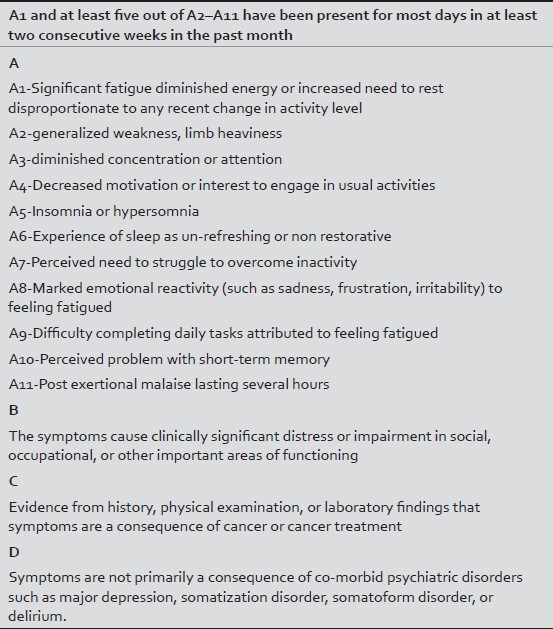Cancer and Fatigue : evaluation of fatigue
After the initial assessment with uni dimensional tool, a detailed assessment is necessary to evaluate and treat the fatigue.
Multi-dimensional scales:
These scales or tools are best suited for research purposes as they evaluate various aspects of fatigue.
Here's a few factors which should be evaluated in the initial assessment before using the tools:
- hemoglobin levels
- other medications
- pain intensity
- fever/infection
- psychological distress
- depression
- anxiety
- malnutrition or deficiencies
The patient's information should be updated on the evaluation sheet. The name, age and sex should be noted.
Having access to patient's treatment information is extremely important.
The following should be NOTED :
- Diagnosis- type and stage of cancer
- Current treatment- chemo/radio , drugs and dosage
- Relevant past treatment history( if any)
- Surgical history
- Hemoglobin levels
Then, further detailed evaluation can be made asking the following questions:
1. Do you experience fatigue or tiredness?
2. If yes, could you describe the pattern of fatigue, like when does it begin, how bad does it get, what relieves it, etc ?
3. How are you getting along with the treatment?
4. Are your sleeping habits and resting patterns changed? (time, duration, etc)
5. Has your appetite reduced?
6. Are you continuing your job/ work ?
Then, a complete physical examination should ideally be done mainly to assess-
- muscle wasting
- gait
- posture changes
- range of motion, etc
Then, one of the following available scales can be used to assess Cancer-related Fatigue.
1. Fatigue Symptom Inventory
This is a 14 point scale which is quite efficient and simple.
http://labpages.moffitt.org/jacobsenp/Copy/FSI%20English%20Version.pdf
2. Multidimensional Fatigue Symptom Inventory
This contains 30 statements and the most suitable answer has to be marked.
http://www.cas.usf.edu/~jacobsen/MFSI-SF%20English%20Version.pdf
3. Brief Fatigue Inventory
It is a short tool consisting of 4 questions and 6 sub-questions to the 4th one.
The above mentioned scales are easily available and can be used easily by translating into suitable languages for the patients.
Many other scales are also available like-
4. Piper Fatigue Self-Report Scale
5. The Schwartz Cancer Fatigue Scale
6. Lee's Visual Analog Scale for Fatigue
7. Cancer Fatigue Scale
8. The Functional Assessment of Cancer Therapy-Fatigue
9. The Functional Assessment of Cancer Therapy-Anemia
10.The Profile of Mood States of Fatigue?Inertia Subscale
Also, there are
Fatigue Intensity Scales
Fatigue/Function measures
The Fatigue Severity Scale
After collecting the data, correct interpretation should me made and the fatigue levels should be noted.
This is done by using the outcome measure methods that every individual scale has.
These scales are useful for the patients as well because it will help them self-assess their fatigue to a certain extent .
This will also help them understand the pattern of change in their fatigue levels.
Also read
5 reasons why you should study Oncology.
Cancer and surgery.
What is Radiation oncology?
What is Cancer-related fatigue?
What is psycho-oncology?
12 causes of cancer.
Cancer in 21st century.




.jpg)
.jpg)

